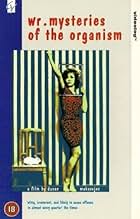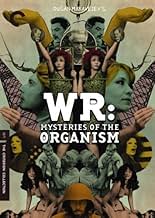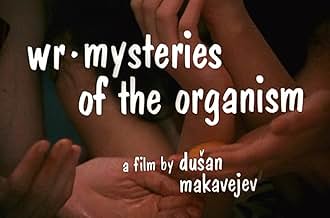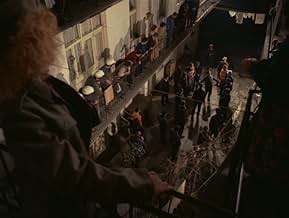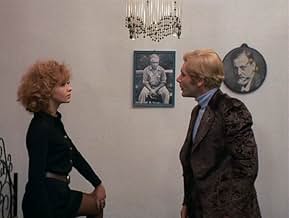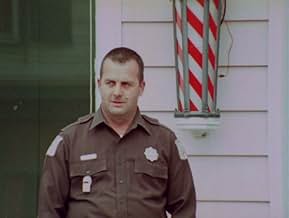VALUTAZIONE IMDb
6,6/10
5650
LA TUA VALUTAZIONE
Aggiungi una trama nella tua linguaAn homage to the work of psychologist Wilhelm Reich, matched with a story about a Yugoslavian girl's affair with a Russian skater. Sexual repression, social systems and the orgone theory are... Leggi tuttoAn homage to the work of psychologist Wilhelm Reich, matched with a story about a Yugoslavian girl's affair with a Russian skater. Sexual repression, social systems and the orgone theory are explored.An homage to the work of psychologist Wilhelm Reich, matched with a story about a Yugoslavian girl's affair with a Russian skater. Sexual repression, social systems and the orgone theory are explored.
- Premi
- 3 vittorie totali
Mikheil Gelovani
- Joseph Stalin
- (filmato d'archivio)
Zedong Mao
- Self
- (filmato d'archivio)
- (as Mao Zedong)
Wilhelm Reich
- Self
- (filmato d'archivio)
David Henry Bradley Jr.
- Self
- (non citato nei titoli originali)
Recensioni in evidenza
I have been trying to see this for many years, particularly after I discovered Reich in my reading in the early 80's, read some of his writings as well as a great biography "Fury on Earth". Now our library has it on a new video release, and I have to say it was worth the wait. It is a masterpiece of documentary insight into its subject Wilhelm Reich, of subversive cinema in that it has a great power to undermine the beliefs of the viewers/participators, and of classical comedy and drama as embodied (literally) in the "fictional movie" within the documentary. Occasionally punctuated by the wild and crazy NY poet/musician Tuli Kupferberg roaming the streets of Manhattan in full battle array and carrying an M-16 (I don't think they could get away with that these days, unless they had a Mr. De Niro in the cast.) Yes, it is blatant hippie/yippie revolutionary zeitgeist of 1968-1971, which was very much fueled by the father of the sexual revolution, Dr. Reich, who had died in 1957 in jail for not answering a subpoena to defend his claims of cancer cures. He said he would be judged by scientists but not by lawyers. Inasmuch as he was the only individual to have his books burned by both Hitler and the US government (FDA), his story and his philosophy should be more widely known, but of course he is still suppressed by some of the powers that be. The erotic content of "WR" is tame in the face of today's hardcore but all the more effective for it, in that Reich condemned pornography but glorified healthy sexuality above all else. And for those "doves" that still populate the earth by the millions or billions, the words and deeds of the good Dr. Reich, who was exiled by Hitler and then Stalin (who is shown in this documentary in some amazing pseudo-heroic films he had made of himself,) still resonate. As do the words of Tuli Kupferberg and his band The Fugs, on the soundtrack: "Kill, kill, kill for peace...Near or far or very middle East..."
I saw this originally at a showing at the British Film Institute years ago and it blew my mind. Every film student should see it. A subversive mix of politics and sex, it shows just how boring and middle class Monty Python, the Farrelly Brothers, et al really are. A non sequitur to the 9th degree, it shows the power that cinema can have on an audience. Considering the age of this film, it is incredible how outrageous it is. Once you've seen it, you will never forget it. It is truly a land mark film in the realm of the surreal. A must viewing for everyone.
WR is one of my two favorite films, and is widely considered by people knowledgable about the film and the era as "one of the most profound and humerous films of the decade". I call it the "Citizen Kane of the Sixties" because it did what the first "Citizen Kane" did earlier - it summarized the realities we all were living with in the Sixites in the Global Village - the reality of sexual repression in both the East and West, the horrors of the McCarthy Era in this country, the obsession with sports in Russia, etc., etc. It is no accident that a still from this film is on the cover of one of the greatest books on film, "Film As a Subversive Art" by film critic and founder of the NY Film Festival, Amos Vogel. I can understand why many Americans do NOT understand this film - the organization of the film, the two overlapping storylines, the music - all so different from the Hollywood material. However, it is considered by many including myself to be a masterpiece, as are all the films by its director, Dusan Makavejev. Together, he and Jean-Luc Godard are the two "Picassos" of film since WW II - and should both be held as two of the greatest filmmakers of all time.
Directed by Serbian filmmaker Dusan Makavejev (also known for directing 'Sweet Movie', and the Australian produced 'The Coca-cola Kid'), the film mixes documentary and narrative cinema, to comment on the infiltration of Soviet Communism, sexual politics/sexual revolution, in a political satire. The main drive of the film to begin with is the work of Austrian-American psychiatrist and psychoanalyst, Dr Wilhelm Reich: His theories of Organon therapy (use of static electricity), and the connection between neuroses in people that is rooted in physical, sexual and social surroundings. This connects also with the work of Alexander Lowen, an American psychotherapist (and student of Reich's), who practices and teaches Bioenergetic analysis which uses therapeutic body work to associate the mind with the body, and in theory release repressed energy through the body sexually without the act of physical sex. I observed in these sequences a kind of connection to the work of Arthur Janov, and his primal scream therapy.
The narrative section of the film tells the story of Milena (Milena Dravic) and her sexually promiscuous flatmate Jagoda (Jagoda Kaloper), and their theories and speeches of sexual revolution: "The October revolution was ruined when socialism rejected free love". They meet a Russian communist figure skater, Ivica (Vladimir Ilivich), who they seduce. But Milena soon discovers that communism has no time for sexuality unless it is first met with physical violence. This seems to be a metaphor for the struggle against Stalinist communism within Yugoslavia since the second world war. But in the film Ivica seems somewhat deluded by the concept of communism (as he states, "communism is a Latin word meaning communal), whilst almost being made rigid by the sexual intentions of Milena.
The most interesting part of the film is the first part that focuses on the life and work of Wilhem Reich (hence the W. R. in the films title). He first started working in psychoanalysis with Sigmund Freud in the 1920's, but after writing books such as 'The Mass Psychology of Fascism', fled Austria for America, where he settled in Maine. He worked on his theories of orgone therapy, and developed the orgone accumulator, an organic box lined with lead that individuals would sit in and is theorised as giving both therapy to the bodies organs and to sexuality (The use of the orgone accumulator was even endorsed by William S. Burroughs.). Eventually Reich was arrested (more than likely the victim of situation - i.e. he was from behind the iron curtain), and viewed as insane - despite being tried in court. All of his books were burned in New York, supervised by the federal food and drugs administration agents (take from that what you will).
It is an interesting film. The different strands are connected by the theories of Wilhelm Reich. But it's one of those films that is probably more interesting to talk about than watch as it is incredibly slow moving, and at times seems to focus on activities (such as bioenergetic analysis), as group fad, and seems to almost fall into a 'new age' enlightenment message. Released in 1971, this would make sense, as the sexual revolution was in full 'swing'. Despite all of this it is a relatively enjoyable piece of cinema, with some nice ideas in it. But again, the life of W R far outshines the film as a whole.
www.the-wrath-of-blog.blogspot.com
The narrative section of the film tells the story of Milena (Milena Dravic) and her sexually promiscuous flatmate Jagoda (Jagoda Kaloper), and their theories and speeches of sexual revolution: "The October revolution was ruined when socialism rejected free love". They meet a Russian communist figure skater, Ivica (Vladimir Ilivich), who they seduce. But Milena soon discovers that communism has no time for sexuality unless it is first met with physical violence. This seems to be a metaphor for the struggle against Stalinist communism within Yugoslavia since the second world war. But in the film Ivica seems somewhat deluded by the concept of communism (as he states, "communism is a Latin word meaning communal), whilst almost being made rigid by the sexual intentions of Milena.
The most interesting part of the film is the first part that focuses on the life and work of Wilhem Reich (hence the W. R. in the films title). He first started working in psychoanalysis with Sigmund Freud in the 1920's, but after writing books such as 'The Mass Psychology of Fascism', fled Austria for America, where he settled in Maine. He worked on his theories of orgone therapy, and developed the orgone accumulator, an organic box lined with lead that individuals would sit in and is theorised as giving both therapy to the bodies organs and to sexuality (The use of the orgone accumulator was even endorsed by William S. Burroughs.). Eventually Reich was arrested (more than likely the victim of situation - i.e. he was from behind the iron curtain), and viewed as insane - despite being tried in court. All of his books were burned in New York, supervised by the federal food and drugs administration agents (take from that what you will).
It is an interesting film. The different strands are connected by the theories of Wilhelm Reich. But it's one of those films that is probably more interesting to talk about than watch as it is incredibly slow moving, and at times seems to focus on activities (such as bioenergetic analysis), as group fad, and seems to almost fall into a 'new age' enlightenment message. Released in 1971, this would make sense, as the sexual revolution was in full 'swing'. Despite all of this it is a relatively enjoyable piece of cinema, with some nice ideas in it. But again, the life of W R far outshines the film as a whole.
www.the-wrath-of-blog.blogspot.com
Silly me I suppose. I had no idea what I was in for. I knew nothing about the movie and it caught me off guard.
At first I though this was being one of those artistic documentary like movies, in which a whole bunch of people are having deep thoughts about life and happiness. It took me a while to realize that it were all characters in this movie and it wasn't being a documentary at all. It's more a sort of satire and if you take it that way this movie is being pretty bearable and good enough for what it is.
Not that this movie is just for everybody though. It's the sort of cheaply made artistic movie, that's filled with metaphors and doesn't necessarily following a main plot line in it. Some people will hate it, while others shall absolutely love it. I was stuck in the middle somewhere.
Thing I liked about this movie is that it's also being the sort of movie that makes you think. It makes you think about what you're seeing and what the characters in it are trying to tell you with their actions and pieces of dialog. It's probably true that you could keep watching this movie over and over again and get more- or completely different things out of it, each time you watch it.
But it's still not my cup of tea. It's being a bit too vague and odd all at times and most of its themes don't even feel all that relevant anywhere in today's world and present morals and standards. Perhaps you should look at it more as a period piece, from a time when there still was sexual repression and communism and capitalism still seemed like a real threat to the world.
Still a great watch for some people. Just not for me.
6/10
http://bobafett1138.blogspot.com/
At first I though this was being one of those artistic documentary like movies, in which a whole bunch of people are having deep thoughts about life and happiness. It took me a while to realize that it were all characters in this movie and it wasn't being a documentary at all. It's more a sort of satire and if you take it that way this movie is being pretty bearable and good enough for what it is.
Not that this movie is just for everybody though. It's the sort of cheaply made artistic movie, that's filled with metaphors and doesn't necessarily following a main plot line in it. Some people will hate it, while others shall absolutely love it. I was stuck in the middle somewhere.
Thing I liked about this movie is that it's also being the sort of movie that makes you think. It makes you think about what you're seeing and what the characters in it are trying to tell you with their actions and pieces of dialog. It's probably true that you could keep watching this movie over and over again and get more- or completely different things out of it, each time you watch it.
But it's still not my cup of tea. It's being a bit too vague and odd all at times and most of its themes don't even feel all that relevant anywhere in today's world and present morals and standards. Perhaps you should look at it more as a period piece, from a time when there still was sexual repression and communism and capitalism still seemed like a real threat to the world.
Still a great watch for some people. Just not for me.
6/10
http://bobafett1138.blogspot.com/
Lo sapevi?
- QuizBanned in Yugoslavia immediately after release.
- Citazioni
Narrator: Comrade lovers, for your health's sake, fuck freely!
- Versioni alternativeAlthough this film was passed uncut for UK cinemas upon its original release, the 1995 Connoisseur Video release used an edited print which was shown on Channel 4 as part of a 1991 censorship season. This TV version used psychedelic computer generated masking techniques to hide some of the more explicit details, including genuine sex during the opening Soviet sex education film, the images on the wall paintings showing people masturbating, and all shots of Jim Buckley's penis as a plaster cast is made of it (which was obscured by digitally animated stars).
- ConnessioniEdited from Il giuramento (1946)
I più visti
Accedi per valutare e creare un elenco di titoli salvati per ottenere consigli personalizzati
- How long is WR: Mysteries of the Organism?Powered by Alexa
Dettagli
- Data di uscita
- Paesi di origine
- Lingue
- Celebre anche come
- WR: Mysteries of the Organism
- Luoghi delle riprese
- Rangeley, Maine, Stati Uniti(Wilhelm Reich Museum/commune and town scenes)
- Aziende produttrici
- Vedi altri crediti dell’azienda su IMDbPro
- Tempo di esecuzione1 ora 24 minuti
- Colore
- Mix di suoni
- Proporzioni
- 1.37 : 1
Contribuisci a questa pagina
Suggerisci una modifica o aggiungi i contenuti mancanti

Divario superiore
By what name was W.R. - Misterije organizma (1971) officially released in India in English?
Rispondi

